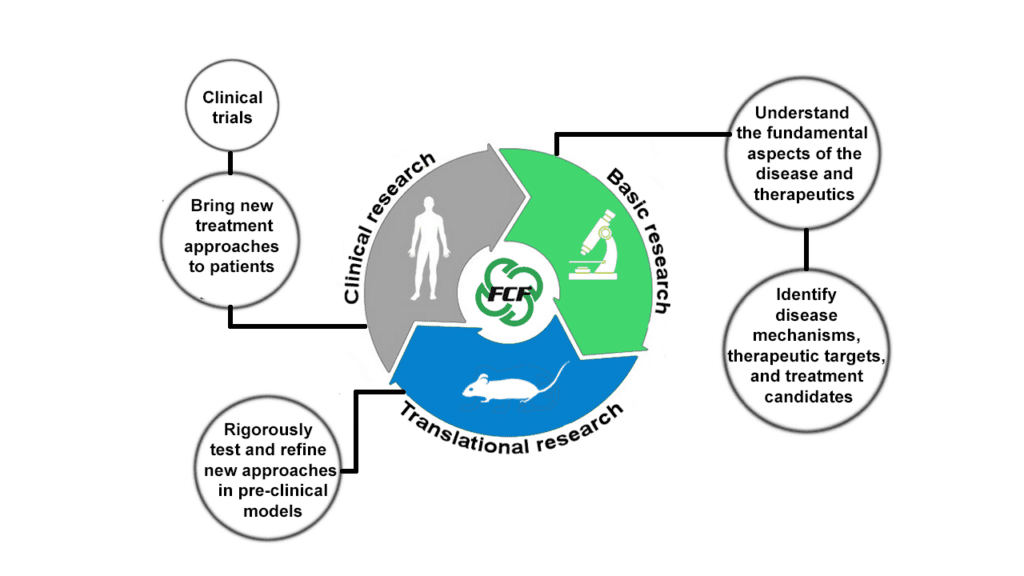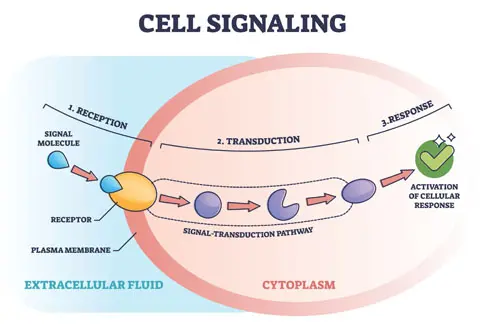Introduction
Prior to the founding of FCF, fibrolamellar carcinoma received minimal research attention. Back then, research on this rare liver cancer had been largely limited to basic descriptions and clinical studies of small numbers of patients. Researchers possessed neither the tools with which to study FLC in the laboratory, nor the fundamental knowledge of FLC’s cause and driving mechanism.
Research grants paid or committed since 2010
Since then, FCF has committed significant funding to research studies conducted at the most prestigious and innovative research and academic institutions in the country (please see the projects and total funding pages for more detail). FCF-funded research has included a broad range of basic, translational and clinical studies (Click here to view an explanation of these three types of research).

As a leading funder of FLC research, our goal is to transform the fibrolamellar research landscape. By supporting cutting-edge research, actively recruiting new investigators to the disease, and working together to understand the origin and development of FLC, we hope to create more effective therapies and ultimately find a cure for the disease.
Treatment Strategies Under Investigation
No standard of care currently exists for FLC. As a result, there is a pressing need to discover new systemic therapies for the cancer. Given the current knowledge of FLC biology, researchers are pursuing several potential approaches to developing more effective treatments for the disease. These include:
- Optimizing chemotherapy for effectiveness against FLC: Despite significant progress in cancer research, chemotherapy (treatments that uses powerful chemicals to kill fast-growing cells in the body), is still an important first-line treatment for cancer. While FLC does not appear to be very responsive to most chemotherapies, a broad-based drug repurposing scan conducted by the Simon lab at Rockefeller University has identified that ironotecan, a topoisomerase I inhibitor, has some limited activity against FLC. They also determined that FLC cells evade programmed cell death by making a lot of BCL-XL protein. Since a combination of a BCL-XL inhibitor plus irinotecan was shown to shrink tumors in mice models, and those tumors did not progress after extended monitoring, a clinical trial of a BCL-XL inhibitor combined with irinotecan is in its planning stages.
- Selectively targeting the fusion protein: Elimination of FLC’s driving DNAJ-PKAc chimeric protein, or inhibition of its activity through the use of targeted molecular therapies would be expected to stop the growth of FLC cells. Unfortunately, normal PKA is critically important for the proper function of many tissues, including heart muscle. A drug that inhibits DNAJ-PKAc but also blocks activity of normal PKA would be expected to cause significant side effects, probably ruling it out as a useful cancer treatment. By contrast, a drug against DNAJ-PKAc that spares normal PKA might be safe and effective against FLC. The creation of such a selective therapy may be possible, however finding one presents considerable challenges. Approaches under investigation include preventing DNAJ-PKAc from being made using RNA drugs, and destroying DNAJ-PKAc in FLC cells with a PROTAC (protein degrader) drug.
- Targeting critical steps in downstream growth/survival pathways: Another strategy to attack FLC would be to inhibit a “downstream” cell signaling pathway controlled by DNAJ-PKAc that is important to the chimeric protein’s ability to drive cancer. Multiple signalling pathways activated in FLC cells have already been identified. These may contain steps that could be targeted without causing the broad side effects expected with the inhibition of PKA or general chemotherapy agents. Many researchers are investigating these pathways for potential drug targets and testing those approaches using models of the disease.
- Using immunotherapy: An alternative approach is to harness the power of a patient’s own immune system to eliminate the cancer. Over the last decade, immunotherapies have revolutionized cancer treatment. Advantages of this approach include the robust and lasting protection seen in some patients, as well as the relatively mild side effects, especially in comparison with chemotherapy. While limited data implies that FLC is usually not very sensitive to current immune checkpoint inhibitor (ICI) therapy, there are suggestions that combining an ICI with other therapeutic agents could enhance anti-tumor immunity. In FLC, the DNAJ-PKAc chimera, which is present in FLC tumors but absent from normal cells of the same patients, could serve as a target for specific immune attack. Vaccines or adoptive cell therapies could also potentially be effective if they can directly enhance a patient’s anti-tumor responses to unique molecules in cancer cells. Phase 1 testing of these approaches is currently underway (see clinical trials).
FCF Research-Funding Criteria
As a foundation, our research funding decisions are driven by four simple principals:

Our main objective is to find effective treatments and a cure for FLC. Because so much is still unknown about the disease, finding that cure requires funding a range of clinical, translational and basic research, and taking educated risks, since not all initiatives will be successful.

We want our investments to make a difference and help bridge existing research gaps. With so much to be done, we prefer to support promising projects less likely to get traditional funding and strive to work closely with researchers to shape proposals to make sure that important efforts can be pursued.

We believe the fastest path to a cure requires researchers to work together collaboratively – rapidly sharing information, materials, and expertise. We actively support and encourage collaboration between scientists and institutions.

Because fibrolamellar is so rare, every patient’s experiences and participation is urgently needed to drive success. We’d like to catalyze that involvement in a way that can make research more efficient, effective and patient-focused. We encourage patient feedback and involvement, and strive to make decisions incorporating patient needs and perspectives.
We also work to steward donations wisely and keep a tight rein on expenses. Due to the generosity of the the Chuck and Marna Davis Foundation and Stone Point Capital which cover all the operating costs of the Foundation, 100% of all donor funds directly drive research into FLC.
Research Status
In the following video from FCF’s September 2020 Virtual Fall Gathering, Mark Furth, FCF’s Chief Science Officer, discusses the state of research into FLC.
Video overview of FCF’s research program. Please see our YouTube channel for other related presentations and panel discussions
In addition, the following article published in 2022, A framework for fibrolamellar carcinoma research and clinical trials, summarizes the key advances made in understanding the disease and discusses critical actions necessary to develop effective treatments for the disease.

